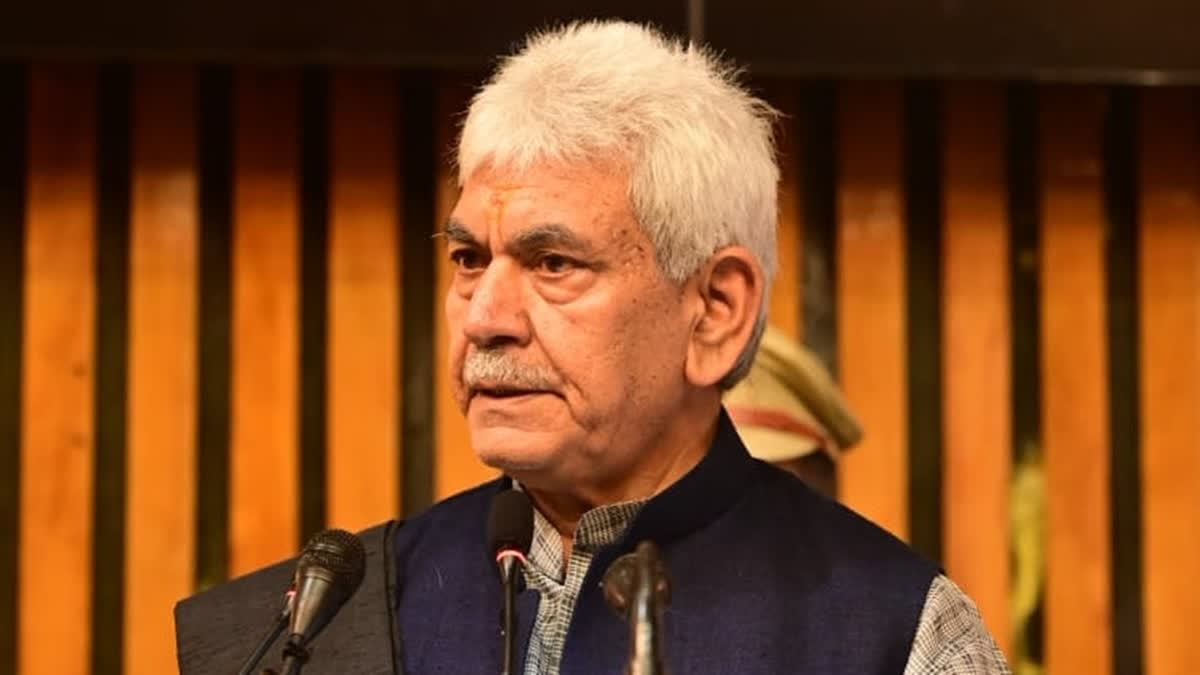Srinagar: Jammu and Kashmir Lieutenant Governor Manoj Sinha said on Sunday that the era of separatist and terror organisations disrupting normal life in the Valley on Pakistan's prodding has been relegated to pages of history, and development and peace are the buzzword here four years after the abrogation of Article 370.
In interaction with a group of journalists, Sinha said it is now entirely up to the Election Commission to take a call on holding assembly elections in the Union territory after the completion of the delimitation exercise and revision of electoral rolls. "J-K administration will follow what the Election Commission of India decides," he said while noting that over 32,000 elected representatives of various local bodies are very much part of the decision-making process in the UT.
Home Minister Amit Shah had given assurance in Parliament that assembly elections will follow the delimitation exercise and that Jammu and Kashmir will also get its statehood at an appropriate time, he noted. If those who have served in constitutional positions and have been members of Parliament don't understand the constitutional process, then there is no cure to their problems, he said in an apparent swipe at opposition parties that have been pushing for elections and the restoration of statehood.
To a question about incidents of 'targeted killings', at times aimed at Kashmiri Pandits and migrant workers, Sinha emphasised on the overall decline in such terror attacks. While people had earlier reconciled to frequent terror incidents, now the expectation is that there should be no such act under Prime Minister Narendra Modi-led government, he said.
Also read: Kashmiri soldier killed in Kulgam encounter laid to rest
"Such an expectation is natural. We are working to create an atmosphere that no such incident happens," he said even as he noted that "chhitput" (sporadic) incidents do happen at times. In a swipe at the previous non-BJP governments, he said efforts were made earlier to buy temporary peace in Jammu and Kashmir while the change under Modi is that his dispensation wants to completely dismantle the "ecosystem" compromising of not only armed terrorists but also those who harboured and supported them.
It was after 34 years that the Ashura procession was allowed here during Muharram, he said to highlight changing scenario. Now people are free to take out any religious procession and the only condition is that there should be no negative reference to the country's unity and integrity, he said. Sinha expressed confidence that Kashmir will be connected by rail network to the rest of the country by next year, while the world on a greenfield expressway between Katra and Delhi is in progress in full swing.
It was on August 5 in 2019 when the Modi government in its second term abrogated Article 370, which gave J-K special rights, and turned the state into a Union territory. While opposition parties have criticised these moves, the ruling BJP has insisted that they have ushered in a period of peace and development, ending frequent strife, especially in the Valley.
"A very big change is the common man is free to live his life on his terms. Nobody's diktats run here any longer," Sinha said. Street violence has fully ended, he asserted, adding that the period when over 150 days in a year were marked by calls of strikes by separatist and militant organisations or by others on Pakistan's prodding has been relegated to history.
One can go to Jhelum Riverfront or Polo View Market at night to see people enjoying themselves and witness the change first-hand, he said and also referred to the beautification drive in several parts of the UT's capital city. To a question about two main regional parties, National Conference and PDP, being critical of the Centre's handling of the region, he said in a dig that their statements highlight the role they have been playing.
A former Union minister who enjoyed a reputation for efficiency and probity as part of the first Modi government, Sinha cited a host of development initiatives to highlight the changes in J-K. There was universal praise of the way Srinagar hosted the recent G20 meeting, he said, adding that the region has become number one in e-governance in the UT category.
Sinha, who took over as LG on August 7, 2020, said his administration has brought more and more services under the Public Services Guarantee Act. From 35 in 2019, there are 675 services are now provided online. It has also introduced an auto-escalation process, meaning that if a service is not provided to a citizen within the stipulated time, it is automatically escalated to a higher authority and action is initiated against the official concerned.
The UT's last budget was Rs 1.18 lakh crore, 2.5 times more than what it was before 2019, and over 85 per cent of the work under the PM's Development Package has been done, he said. While the region saw private investment of around Rs 14,000 crore from 1947 to 2021, when the new industrial scheme was unveiled, projects worth Rs 26,000 crore to 27,000 crore are going on currently and this will rise to Rs 75,000 crore in the next two years, providing direct employment to 5 lakh people, he claimed.
The administration has allotted land to around 1,700 firms and nearly 1,000 of them have paid the premium. Over 127 of them have begun production, official sources said. (PTI)



